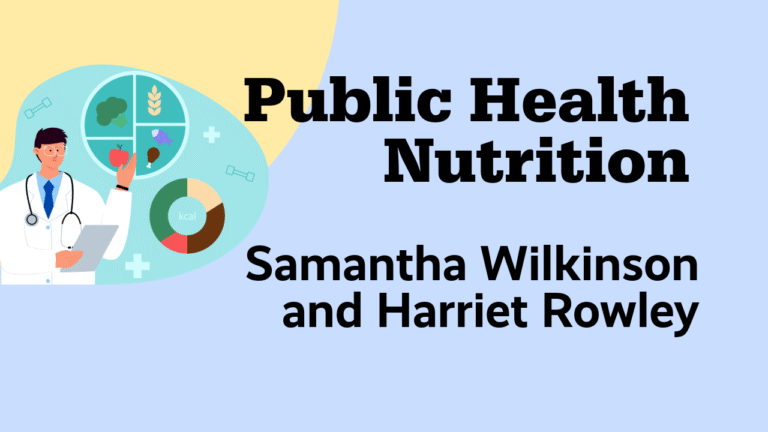Incorporating employability and real-world scenarios into assessment practices, demonstrating meaningful learning and skill/attribute development.
Dr Orla Flannery, Senior Lecturer in Nutrition and Department Employability Lead, Sport and Exercise Sciences. Interests: Public Health Nutrition, Healthy eating and weigh management, Behaviour Change, Employability and Work Integrated learning.
Ann Hunt, Programme Support Tutor (Nutrition) and Public health Nutritionist, Department of Health Professions . Interests: Public Health Nutrition, Simulation, Sensory Analysis , Student Support and Building Community
Authentic Assessment for Employability
Dr Orla Flannery¹ and Ann Hunt²
Manchester Metropolitan University ¹Faculty of Science and Engineering ²Faculty of Health and Education
Overview
We are currently facing a ‘public health emergency’ as highlighted by the House of Lords Diet and Obesity Committee (2024), which has called on the Government to address the obesity and diet-related diseases that impose a substantial financial burden on society each year in terms of lost productivity and healthcare costs. The assessment for the module Public Health Nutrition responds to public health emergencies through authentic assessment which builds students’ employability. Gulikers et al. (2004) defines authentic assessment as the type of assessment that requires students to employ the same set of competencies, knowledge, and attitudes that are necessary in a real-world setting.
We have been delivering Public Health Nutrition at Level 6 and Level 7 across two Faculties (Science and Engineering, and Health and Education) at Manchester Metropolitan University (MMU) for 5 years. The interdisciplinary unit provides a unique opportunity for students to collaborate with students across different programmes and from a range of diverse backgrounds and cultures. The assessment is designed to equip our BSc and MSc Nutrition students with the skills and attributes essential for the professional world in the midst of a public health crisis. The primary objective of the authentic assessment is for student groups to develop a public health nutrition campaign from conceptual design through to delivery, emulating real-life public health practice. Students are given autonomy to create their groups and to develop an idea based on a thorough needs analysis of the evidence at a local, national and international level.
We have established connections with local health and community groups, identifying the need for evidence-based nutrition information across various population groups, cultures, and health issues across Greater Manchester. These groups include the African Caribbean Community, MCRactive, Sure Start and Intergenerational England. Consequently, students are creating campaigns tailored to the local community, providing exceptional Campus Connection to Place, and fostering a sense of belonging and significance among our students. The organisations are then invited to the assessment day, where they discuss with students their campaign and provide them with feedback on their work.
The teaching, learning, and assessment practices offer an outstanding student experience and excellent graduate prospects. In groups of four or five, students conduct a needs analysis on a specified topic and subsequently create an evidence-based public health campaign. Through this assessment, students acquire a broad range of skills, including project management, digital literacy, communication, and teamwork. Students are directed to the MMU RISE initiative, which provides opportunities for learning new skills beyond the course curriculum. For instance, they are encouraged to complete courses on Adobe and Social Media management. This culminates in the creation of websites, social media content, leaflets, recipes, and posters, which students can utilise as part of a portfolio to showcase their work and competencies to potential employers and provides the opportunities to gain additional qualifications thereby enhancing their CVs. Additionally, they gain insights into teamwork and the importance of effective communication for successful group outcomes.
Internationalisation
The module is taught across two different Faculties and five different degree programmes as UG and PG level at Manchester Met. In our 2023/2024 cohort we had over 60 International Students complete the module. These students developed health campaigns for their home country, resulting in the creation of Public Health Nutrition campaigns for community groups in India, Nigeria and Pakistan.
Case study
In 2024 we had a number of groups of International MSc students who produced resources in their local languages promoting breastfeeding and healthy eating and a Vitamin A campaign. Vitamin A deficiency is a serious public health condition in low income countries (WHO, 2024). To address this issue a group of MSc students developed and implemented a campaign to raise awareness about Vitamin A deficiency and this in their local community (see video which showcases the material created in the module on Vitamin A been implemented to a group in Nigeria).
Impact Evidence
The unit demonstrates how authentic assessment can provide students with skills needed in practice. As is evidence in the comments below from the anonymous module survey, students recognise how the module provides them with the skills needed in the real world and improves career readiness.
Student Impact (module survey comments) 2024
- “The teaching of Orla is excellent, and practical assessment, which is teamwork campaign, is a great opportunity to improve this skill”.
- “Interesting topic, a LOT of information covered but was comprehensive and definitely useful skills for whatever nutrition field you go into. Appreciated the chance to build ‘the assignment’ over the course of the module”.
- “I appreciated the challenging nature of the task, as it provided a glimpse into the real-world dynamics of campaign management, an area I had not previously explored. Collaborating with my teammates to plan the campaign was enjoyable and insightful. Overall, it was a great learning experience that effectively blended teaching with practical application”.
- “Of all the courses in this MSc program, I believe this unit is exceptionally valuable”.
Graduate Outcomes Data (2021/22)
Below are the GO for the UG courses.
| Key measures | BSc Nutritional Sciences | BSc Sport and Exercise Nutrition |
| Graduate prospects | 90.0% (72.7% in 20/21) | 100.O% (40% in 20/21) |
| Activity meaningful | 72.2% | 100.0% |
Career Readiness
Data from MMU in relation to Career Readiness for year-on-year progression for the BSc Sport and Exercise Nutrition (Figure 1) and BSc Nutritional Sciences (Figure 2). The PHN module is delivered in Level 6 and there a significant increase in students’ readiness to apply.

Figure 1. BSc Sport and Exercise Nutrition

Figure 2. BSc Nutritional Sciences
This submission for the ‘Authentic Assessment for Employability’ category exemplifies how real-world scenarios can be effectively incorporated into assessment practices, ultimately enhancing employability and demonstrating meaningful learning and skill development. Whilst also providing students to connect with the wider University community and improve belonging and mattering and showcases how authentic assessment can benefit the students and the wider community.
References
Gulikers, J.T.M, Bastiaens, T.J., & Kirschner, P.A. (2004). A Five Dimensional Framework for Authentic Assessment. Education Technology Research and Development, 52, (3), pp 67-86.
House of Lords Diet and Obesity Committee (2024) The Government needs a plan to fix our broken food system and turn the tide on the public health emergency – Committees – UK Parliament. Accessed 2025.


